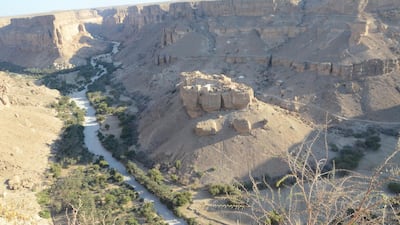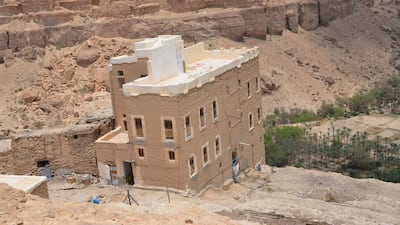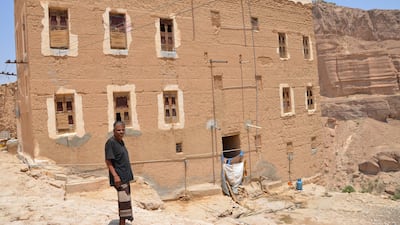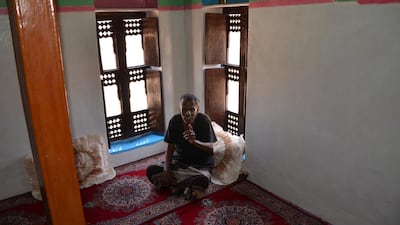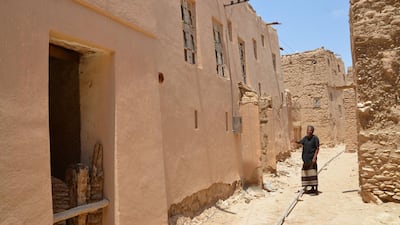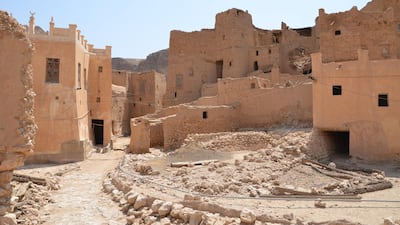Haid Al-Jazil could well be one of the most unique places on the planet. The precarious village is perched on a giant rock and overlooks a long, mostly deserted valley in the Yemeni district of Dawan in Hadhramaut province.
Of the hundreds of people who once called this village home decades ago, a 2004 census revealed a population of just 17, all of them defying isolation, loneliness and some of the toughest topography.
Abu Baker Ahmad Bamousa Al Amoudi, his wife, and their eight children are the only family who live in their home alone; others share.
“My late father advised me to stay here until I die. My father and mother lived and were buried here,” the 49-year-old farmer says as he gives us rare access to his remote abode.
Inside the small village
Al Amoudi's mud-brick home is one of 45 in the village and one of just three that are habitable. It offers an impressive view of the valley and its palm groves. A fresh breeze blows on us as we enter the property.
Years of heavy rains, erosion and a lack of regular upkeep have left almost 70 per cent of homes in ruins. “Look at my house,” he says with pride, pointing towards his green guest room. “It looks new and beautiful. I quickly fix problems; it survived while others fell apart.” From its position on the clifftop, he is able to keep an eye on his farmland below. Many years ago, he and his neighbours used to walk on rooftops to visit nearby relatives. “We have an interrelated large family [the Al Amoudi tribe] who lived here for ages,” he says.
As we wander around this intriguing village that dates back 500 years, we find out that the architecture of the structures here was partially responsible for many that collapsed. “Look at that house, once it was teeming with people – 30 people used to live there,” says Al Amoudi, pointing to a derelict property coated with clay. A date engraved on its wooden door tells us it was built almost 100 years ago. Rainwater weakened its foundation and termites gnawed at the wooden ceiling and structural pillars.
The streets we walk along are dirty, narrow and quiet. The only sounds that break the silence are those of the farmer’s donkey or the chirping birds overhead. Our host earns a living by cultivating a farm down deep in the valley. His wealthy relatives in Saudi Arabia also contribute to his survival by sending the family money. There is no school or health facility here. There is no convenience store either. The sick are carried on donkey to the valley and then taken by car to a local hospital, which is almost an hour’s drive away.
Life in isolation
Al Amoudi’s sons used to make their way to junior school there on foot, until a small lorry became available. They dropped out of secondary school when the expense became too much for their father to bear. “I asked them to stay at home, since I had no money to pay for their education,” he says quietly as if a little ashamed.
His six girls have never been to school. “Girls cannot go alone as the road is long and unpaved,” he admits, adding that the villagers put a gate at the main entrance to Haid Al-Jazil four years ago after a thief was caught trying to break into one of the homes. Today, visitors must ring the gatekeeper to gain entry. “I do not open the gate in the evening even if someone calls me,” Al Amoudi says.
The population has fallen dramatically in the past three decades, with many locals relocating to Saudi Arabia where the salaries and lifestyle are more appealing. Those who stayed behind were mostly children or the elderly.
Al Amoudi says that when the older generation died, the younger residents opted to do what their fathers had done before them and head to Mukalla – a port city and the capital of Yemen’s Hadhramaut governorate.
An optimistic outlook for the future
Life here is not easy. The condition of the roads means only off-road cars are able to navigate the way here. Below, there is a small village where people park cars and then load their donkeys for the trek on a high road that is paved with cobblestones. Despite the difficulties, the farmer believes the younger villagers are better off than their ancestors were.
“Life was much harder [when I was young]. Thanks to God, now water is supplied to my house through pipes and there is electricity,” he tells me. The main power grids were built by the local authorities in Hadhramaut, and villagers can access electricity between 6pm and 5am daily. Water services were funded by Saudi philanthropists from Dawan district.
________________
Read more
Egypt's elusive nomadic Bishara tribe and their Gabal Elba home
Fadi Kattan: The Palestinian chef dishing gourmet cuisine under occupation
Amman's first English-language lending library has more than 27,000 books
________________
It’s rare for Haid Al-Jazil to attract outside interest, especially in today’s political climate, with the civil war raging around them. There is a large contingent of security forces in place in Dawan, which has a permanent military outpost where soldiers are trained. It’s also where the army has set up checkpoints, and where raids have been launched on suspected Al Qaeda hideouts.
A compound of mud brick chalets were built 10 years ago by Saudi businessman Abdullah Ahmed Bugshan, overlooking the village with foreign guests charged 15,000 Yemeni riyals (Dh220) per night.
After spending some time in Al Amoud’s beloved Haid Al-Jazil and getting to know the man who wouldn’t give this life up for anything, it is obvious that he remains optimistic that its best days will be back, but first the roads need fixing and expanding.
“We just want the road to be paved, and I assure you that people would come back to their homes.”
